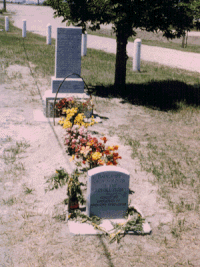
Rebecca Winters (pioneer)
From Wikipedia, the free encyclopediaRebecca Winters

Grave of Rebecca Winters
Born Rebecca Burdick
January 16, 1799
Canajoharie, New York, U.S.
Died August 15, 1852 (aged 53)
near Scottsbluff, Nebraska, U.S.
Religion Latter-day Saint
Spouse(s) Hiram Winters
Children Oscar Winters
Alonzo Winters
Hiram Adelbert Winters
Rebecca Winters
Helen Melissa Winters
Parent(s) Gideon Burdick
Catharina Schmidt
Rebecca Burdick Winters (January 16, 1799 – August 15, 1852) was a Mormon pioneer who with her family left the eastern United States to emigrate to the Salt Lake Valley with other Latter-day Saints. In August 1852, en route to present-day Utah, she died of cholera near present day Scottsbluff, Nebraska. Her grave, located in the Rebecca Winters Memorial Park, has become a popular landmark along theMormon Trail and is a Nebraska State Landmark.[1]
Biography[edit]
Origins[edit]
Rebecca Burdick was born to Gideon Burdick and Catharina Schmidt in Canajoharie, New York. In 1806, Catharina died; Rebecca was only seven years old at this time. Rebecca's father, Gideon, then married Jane Ripley Brown, and when Rebecca was 18 the family relocated to Athens County, Ohio. Here she met Hiram Winters and they were married in 1824. Eventually the two were introduced to Mormonism and joined the Latter Day Saint church. They moved their family to Kirtland, Ohio, to gather with other church members.[2] Burdick's brother, Thomas Burdick, was also converted to the church.
When living in Kirtland, Rebecca and Hiram were caretakers of theKirtland Temple.[3]
The Trek West[edit]
After leaving Kirtland, the Winters family briefly stayed in Nauvoo, Illinois, before leaving on the Mormon Trail with the James C. Snow Wagon Company in June 1852.[4] On August 13 of that year, while near Chimney Rock, Rebecca became sick with cholera, and the illness continued to get worse until she died on August 15. Following her death, William Reynolds, a family friend, carved her name and age into an iron wagon tire and buried it to mark the grave's location.[5]
Grave site and relocation[edit]
After the completion of the Union Pacific Railroad, Mormon pioneers stopped traveling by foot and Winters's grave was all but forgotten. Farmers in the Scottsbluff area knew about the grave, but it was not until the end of the 20th century that the grave became a tourist attraction. It was during this time that the Burlington & Missouri Railroad was running a railroad line through the Platte Valley, and after discovering the marked grave, they rerouted the tracks from their original plan to avoid disturbing it. For almost 100 years, thousands visited the grave site, so in 1995 the Burlington Northern Railroad decided to relocate the grave for the safety of visitors (due to its proximity to the railroad tracks). In September 1995, her body was exhumed and relocated a little further east and north of the original location. In June 1996, hundreds of Winters's descendants gathered for the dedication of the Rebecca Winters Memorial Park. The grave remains one of the few marked graves along the Mormon Trail.
References[edit]
Jump up^ Scotts Bluff County Tourism. "Rebecca Winters Grave". Nebraska's Landmark Country. Retrieved 18 October 2010.
Jump up^ Olsen, Beth R. Among the Remnant who Lingered Micro Dynamics Electronic Publishing, Inc., Orem, Utah, 1997.
Jump up^ Olsen, Beth R. Among the Remnant who Lingered Pg. 33, Micro Dynamics Electronic Publishing, Inc., Orem, Utah, 1997.
Jump up^ "Mormon Pioneer Overland Travel, 1847–1868", History.LDS.org(Church History Library, LDS Church), retrieved 2013-08-19|chapter= ignored (help)
Jump up^ Olsen, Beth R. Among the Remnant who Lingered Pg. 77-78, Micro Dynamics Electronic Publishing, Inc., Orem, Utah, 1997.
External links[edit]
The Rebecca Winters Genealogical Society
Mormon Historical Sites Registry - Rebecca Winters Grave
Helen Hughes Vick, "Woman of the Dead", The Friend, April 1993.
Contents [hide]
1 Biography
1.1 Origins
1.2 The Trek West
1.3 Grave site and relocation
2 References
3 External links

In the year of 1852 my happy father left his native land and all his kindred but his youngest brother Levi W. Reynolds whom he sponsored to the far west, greatly to the dissatisfaction of his elder brothers because of their unbelief in what was called by them the Mormon Doctrine. My father was sincere in his belief and enduring faith and joyfully took up his ox whip and steered the way of his covered wagon with his dearest treasures and all his human possessions. He had been a wise and helpful co-worker with my mother's father in the years of preparation for their long journey into the wilderness of the west. He was a true son to his wife's parents and they loved and honored him as did all who knew him for his genial, upright, helpful ways as a husband and father. He was as perfect as a mortal could ever be. As a saint of the living God, his faith and integrity was true to the end.
On that long eventful pioneer journey, his inventive genius, skill and efficiency seemed in constant demand, being ever ready to repair damage for all in need. Never was he too busy to lend a helping hand. He quickly detected defective mechanism in any machinery for which he knew the remedy. In my recollection, I can see him now trudging patiently the old rough trails managing his two yoke of oxen more with his kind words and gentle voice than with the whip in hand. He was ever on the alert to pick up the pretty pebbles or shells for me, and especially any lost or cast off article found along the trail.
No comments:
Post a Comment